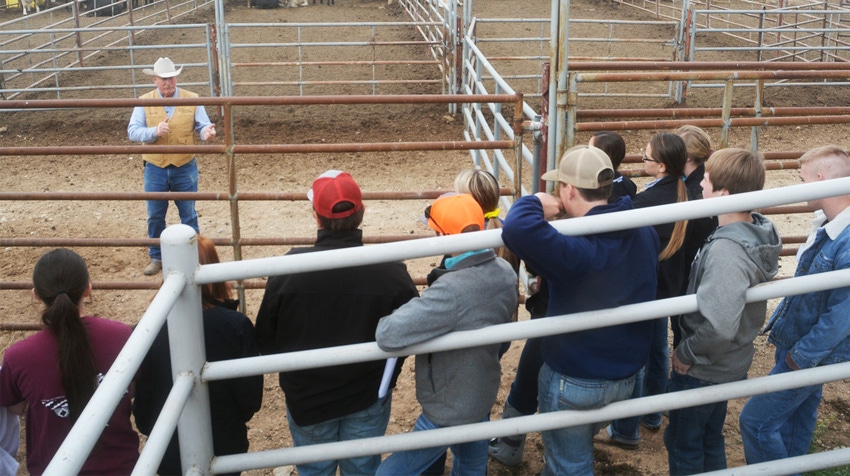
The Texas Education Agency has added the Feedyard Technician Program for high school students to its certified Career and Technical Education list.
The program is jointly sponsored by Texas A&M AgriLife Extension Service, Texas Cattle Feeders Association and West Texas A&M University
The Career and Technical Education program ensures Texas students are prepared for in-demand, high-skill, high-wage careers, according to TEA. About 200 industry-based certifications for public school accountability were approved for 2019-2020.
Brady Miller, Texas Cattle Feeders Association director of market, membership and education in Amarillo, said now in addition to student participants receiving a certification, their high schools get credit for the program on the A-F accountability rating system mandated by law in Texas.
Criteria for industry-based certification requires businesses, industries, professional organizations, state agencies, government entities or state-based industry associations be familiar with the certification and value it.
The industry must signal the value of the occupation-specific certification by including the certification in job postings as required or highly recommended; using the certification as a factor in selecting candidates for an interview and/or hire; and/or offer higher pay for those who possess the certification, according to TEA rules.
TEA also requires a third party to provide an assessment of the certification using predetermined standards for knowledge, skills and competencies.
MEETING THE NEED
Robert Devin, AgriLife Extension Agricultural Workforce and Community Development program coordinator in Canyon, said the feedyard technician program was born out of a need identified by the livestock industry during a “futuring” conference about a decade ago.
The conference was aimed at determining the biggest issues facing the industry in the next 10 years, and labor was identified as a major factor, he said.
As a result, the three entities teamed up to develop a program to address that issue. The Feedyard Technician Program started in 2013 and is designed for high school juniors and seniors who may have an interest in the fed cattle industry, Miller said.
The program has two certified segments: cattle care and handling in the spring and machinery operations, repair and maintenance in the fall, he said. The cattle welfare and handling segment this year had about 90 students from 18 schools participate.
“We work through the agricultural sciences teachers in local schools to identify students, and they provide some of the training in their classroom setting,” Devin said. “We augment that with additional training through online videos and hands-on training.”
He said the cattle care and handling segment targets high school juniors and seniors who have taken four or more agricultural classes focused on Livestock Production, Principles of Agriculture, Food and Natural Resources, and Veterinary Medical Applications.
Classes taken outside the agricultural program and/or work experience may be substituted if approved by the agricultural science teacher, Devin said. Students should also participate in an extracurricular activity such as FFA or 4-H or have some type of supervised project experience.
This year’s segment just wrapped up onsite training on pharmaceuticals, proper injection and management of pharmaceuticals, sanitation and cattle care and handling, he said. The instruction on cattle care and handling was provided by Dr. Ron Gill, AgriLife Extension beef cattle specialist, College Station, and the pharmaceutical training was conducted by Dr. Ted McCollum, retired AgriLife Extension beef cattle specialist, Amarillo.
The students also receive training in interviews, Devin said, and are given written, skills and interview tests at West Texas A&M to determine their understanding and ability to read a label, perform proper injections and implant procedures.
The fall machinery operations, repair and maintenance segment targets students who have taken classes including Agricultural Mechanics, Metal Technology and Agricultural Power systems, he said.
It provides hands-on training in wheel loader and skid loader operation, and lockout-tagout safety procedures, Devin said. Students also visit a feed mill and feed yard to understand some of the job opportunities associated with the industry that are not directly related to cattle.
Testing is also provided at West Texas A&M on skills involving welding, cutting, bending and lockout-tagout, Devin said. A written test and interview also are associated with this portion of the program.
MAKING A DIFFERENCE
“This program continues to grow,” Miller said. “We continue to improve it year after year. As an industry, we see a huge need for the program to try to catch these students early enough so they will know there is an industry out here that needs them and offers a vast range of opportunities.
“Over the last six years, our member feed yards have taken a liking to the program, because it shows them that not only are the students coming in with some much-needed background and skills, but they also took time to learn more about the industry.”
He said the industry considers the interview as an important piece of the program, because it mirrors that of a student interviewing for a job.
“We feel this is super important,” Miller said. “Our theory is it doesn’t matter how much you know if you don’t know how to interview and get your foot in the door to be hired for a job.”
Also, he said, each student after completing the testing and hands-on training is provided a certificate of completion. They can take this to feed yards to show where they are proficient.
“We have run 458 students from about 25 different schools through the program – both segments combined,” he said. “And some of those students are going out and getting internships and finding employment within the feed yards.”
Miller said they consider the program as a living program, “so as we see the need to add different pieces and segments, we have the ability to do that.”
For more information on the Feedyard Technician Program, go to https://amarillo.tamu.edu/feedyard-technician-program/.
About the Author(s)
You May Also Like




